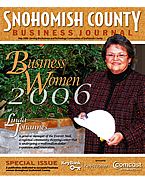 |
|
|
YOUR
COUNTY.
|
YOUR
BUSINESS JOURNAL.
|
Understanding
nuts, bolts
of Initiative 920
By
Carl Gipson
Guest Editorial
The estate tax has been controversial in Washington state since its inception in 1901. Opponents call it the “death tax” because a person is not assessed the tax until they have passed away — the only tax levied on a person who is never going to be around to pay the bill. Initiative 920 would repeal the state estate tax.
In the heat of the debate, several key facts are misused or ignored. The Washington Policy Center publishes unbiased information so voters can understand the important topics facing them, which is why we published “A Citizen’s Guide to Initiative 920.”
In the report, we address some of the history behind the estate tax in both Washingtons — here and D.C. In 1981, Washington state voters threw out the estate tax by passing Initiative 402. While estates were still subject to the federal estate tax, the state government took a share of what was owed to the feds.
In 2001, Congress passed the Economic Growth and Tax Relief Reconciliation Act (EGTRRA) — otherwise known as the Bush tax cuts. A bit of a misnomer, it also has been referred to as the repeal of the federal estate tax — when, in fact, it lowered the federal estate tax rate, made fewer estates subject to the tax and only repeals the entire tax system during the year 2010.
When Congress passed the EGTRRA, the state government should have complied with the new tax rules and collected less estate tax from fewer estates. The state Department of Revenue failed to do so. An ensuing court case led to the state Supreme Court throwing out the state estate tax system — and made the Department of Revenue refund several families over $150 million.
In 2005, the state Legislature, claiming a hole in state revenue could not be tolerated, enacted a new estate tax, one that is permanent and would not go away in 2010. Estates worth less than $2 million are exempt, as are family farms. Everyone else gets to pay between 10 percent and 19 percent depending on the value of the estate.
Legislators channeled the money from the new estate tax to the education legacy trust, which funds the student achievement fund. Previously, the estate tax revenue had funded general government operations.
If I-920 passes, it will repeal the system that legislators passed last year. Estates will still be subject to the federal estate tax (rates currently top out at 45 percent) even if it passes.
The importance of the estate tax is being overhyped during the campaign season. It makes up a very small percentage of all the tax revenue the state pulls in each year — less than 1 percent. And as a percentage of gross state product (a measure of total economic output), the estate tax revenue is miniscule.
The Department of Revenue says it will take in about $100 million from estate tax revenues this year. One hundred million of anything is not exactly a drop in a bucket, but when compared to the education budget for 2006 ($5.5 billion), it is. Supporters of the estate tax system say the state desperately needs that $100 million for education purposes.
Arguments against the estate tax usually surround its impact on small and family-owned businesses. The $2 million exemption is not very much if one has to include assets like machinery, vehicles, property, etc.
There is a flood of evidence that shows the higher a tax rate on a business, the lower its economic output (meaning jobs and profits). If the estate tax is affecting the flow of capital in or out of a business, then its effect is undeniable.
Washington is in continuous competition with Idaho and Oregon to attract new and expanding businesses to the Pacific Northwest. Oregon has both a state estate tax and an estate income tax. Idaho has no estate tax.
But many supporters of the current estate tax are less worried about business’s profits and more about wealth inequality. They are afraid that if a family keeps passing the family fortune to its heirs there will be less money available for the rest of us and only a proliferation of Paris Hiltons to show for it.
Voters face the prospect of repealing the estate tax for the second time in 25 years. And though it was repealed overwhelmingly in 1981 it will be interesting to see if attitudes have changed toward the estate tax.
Carl Gipson is director of the Center for Small Business and Entrepreneurship at Washington Policy Center. For more on Initiative 920, see “A Citizen’s Guide to Initiative 920,” available online at www.washingtonpolicy.org.













